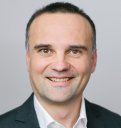Keynote Talks @ DFT 2020
 Prof. Luca Benini holds the chair of digital Circuits and systems at ETHZ and is Full Professor at the Universita di Bologna. He received a PhD from Stanford University. He has been visiting professor at Stanford University, IMEC, EPFL. He served as chief architect in STmicroelectronics France. Dr. Benini's research interests are in energy-efficient parallel computing systems, smart sensing micro-systems and machine learning hardware. He has published more than 1000 peer-reviewed papers and five books. He is an ERC-advanced grant winner, a Fellow of the IEEE, of the ACM and a member of the Academia Europaea. He is the recipient of the 2016 IEEE CAS Mac Van Valkenburg award and of the 2019 IEEE TCAD Donald O. Pederson Best Paper Award. For more information, please see his webpage at https://www.unibo.it/sitoweb/luca.benini/cv
Prof. Luca Benini holds the chair of digital Circuits and systems at ETHZ and is Full Professor at the Universita di Bologna. He received a PhD from Stanford University. He has been visiting professor at Stanford University, IMEC, EPFL. He served as chief architect in STmicroelectronics France. Dr. Benini's research interests are in energy-efficient parallel computing systems, smart sensing micro-systems and machine learning hardware. He has published more than 1000 peer-reviewed papers and five books. He is an ERC-advanced grant winner, a Fellow of the IEEE, of the ACM and a member of the Academia Europaea. He is the recipient of the 2016 IEEE CAS Mac Van Valkenburg award and of the 2019 IEEE TCAD Donald O. Pederson Best Paper Award. For more information, please see his webpage at https://www.unibo.it/sitoweb/luca.benini/cv
Talk title: Living with imprecise computation: an energy efficiency perspective
 Mr Jan Andersson, M.Sc in Computer Engineering focused on digital design and embedded systems. Working at Cobham Gaisler as Director of Engineering, where he oversees hardware and software development efforts and leads implementation of the system-on-chip architecture roadmap. Jan's accomplishments includes development and verification of the GR740 LEON4FT quad-core LEON4FT, UT700 LEON3FT, and GR712RC dual-core LEON3FT space-grade microprocessors and extensive experience of development of digital IP cores within processors and peripherals.
Mr Jan Andersson, M.Sc in Computer Engineering focused on digital design and embedded systems. Working at Cobham Gaisler as Director of Engineering, where he oversees hardware and software development efforts and leads implementation of the system-on-chip architecture roadmap. Jan's accomplishments includes development and verification of the GR740 LEON4FT quad-core LEON4FT, UT700 LEON3FT, and GR712RC dual-core LEON3FT space-grade microprocessors and extensive experience of development of digital IP cores within processors and peripherals.
Talk title: Fault-Tolerance in Current and Future LEON and NOEL-V System-on-Chip Architectures
Cobham Gaisler AB is a microprocessor IP and space-grade microprocessor component vendor based in Göteborg, Sweden. The GR740 quad-core LEON4FT microprocessor and GR716 LEON3FT microcontroller have been developed within a series of ESA activities under the topics Next Generation Microprocessor and Microcontroller for Embedded Space Applications. The keynote will describe the system-on-chip architectures of these devices and the approach to achieve fault-tolerance in the two classes of processors. The keynote will also outline plans and features for future system-on-chip architectures that are in development targeting space applications.
 Mr Wilfried Steiner, is the Director of the TTTech Labs which acts as center for strategic research as well as the center for IPR management within the TTTech Group. Wilfried Steiner holds a degree of Doctor of Technical Sciences and the Venia Docendi in Computer Science, both from the Vienna University of Technology, Austria. His research is focused on dependable cyber-physical systems, in particular in the following domains: automotive, space, aerospace, as well as new energy and industrial automation. Wilfried Steiner designs algorithms and network protocols with real-time, dependability, and security requirements. Wilfried Steiner has authored and co-authored over eighty peer-reviewed scientific publications and is inventor and co-inventor of twenty-five patent families with about another ten patent families pending. Wilfried Steiner has successfully participated in multiple national and international publicly funded research projects. In particular, from 2009 to 2012 Wilfried Steiner has been awarded a Marie Curie International Outgoing Fellowship that has been hosted by SRI International in Menlo Park, CA. Wilfried Steiner also acted as editor for the SAE AS6802 standard (Time-Triggered Ethernet), served multiple years as voting member in the IEEE 802.1 that standardizes time-sensitive networking (TSN), and is currently member in the ISO TC 22 that develops standards for safe autonomous road vehicles.
Mr Wilfried Steiner, is the Director of the TTTech Labs which acts as center for strategic research as well as the center for IPR management within the TTTech Group. Wilfried Steiner holds a degree of Doctor of Technical Sciences and the Venia Docendi in Computer Science, both from the Vienna University of Technology, Austria. His research is focused on dependable cyber-physical systems, in particular in the following domains: automotive, space, aerospace, as well as new energy and industrial automation. Wilfried Steiner designs algorithms and network protocols with real-time, dependability, and security requirements. Wilfried Steiner has authored and co-authored over eighty peer-reviewed scientific publications and is inventor and co-inventor of twenty-five patent families with about another ten patent families pending. Wilfried Steiner has successfully participated in multiple national and international publicly funded research projects. In particular, from 2009 to 2012 Wilfried Steiner has been awarded a Marie Curie International Outgoing Fellowship that has been hosted by SRI International in Menlo Park, CA. Wilfried Steiner also acted as editor for the SAE AS6802 standard (Time-Triggered Ethernet), served multiple years as voting member in the IEEE 802.1 that standardizes time-sensitive networking (TSN), and is currently member in the ISO TC 22 that develops standards for safe autonomous road vehicles.
Talk title: Design Rationales for Fail-Operational Safety Platforms
Over the last several decades TU Wien and TTTech have researched reliable platforms for safety-critical cyber-physical systems. Today, the technologies resulting from this research are used in human-space programs, civil aerospace, and advanced driver assistance systems in modern cars. In this talk I will discuss design rationales of the platforms (i) Time-Triggered Ethernet (space/aerospace Domain), (ii) MotionWise (automotive), and (iii) the Safety Co-Pilot (self-driving cars). I will highlight similarities in the underlying technical paradigms and point out major differences.
